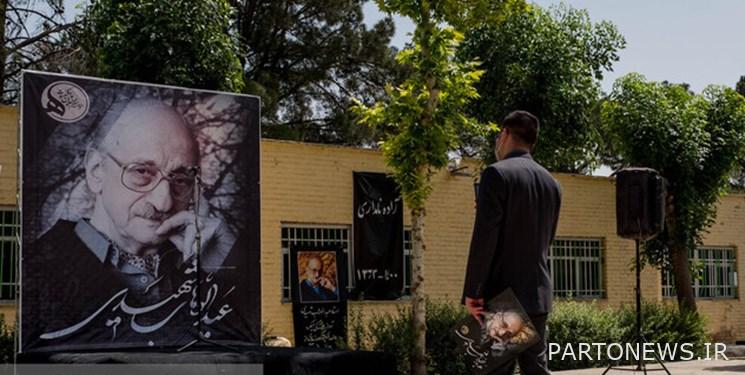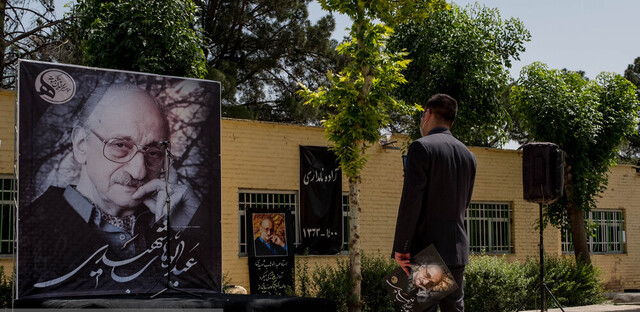The anniversary of the death of “Abdul Wahab Shahidi” was held

According to the music correspondent of Fars News Agency, the commemoration ceremony of the anniversary of the death of “Abdolvahab Shahidi” called “Oud Man” was held in the presence of prominent music figures of the country in Andisheh Cultural Center.
In this ceremony, figures such as Hassan Nahid, Fereydoun Shahbazian, Mohammad Mousavi, Mazda Ansari, Alireza Mir Alinaghi, Majid Nazempour, Alireza Fereydounpour, the family of Master Shahidi and … were present. The Andalib ensemble, led by Shaho Andalibi, also performed music with the singing of Ali Jahandar.
Seyed Alireza Mir Alinaghi was the keynote speaker at the ceremony. He said: “Years before Master Shahidi passed away, I wrote a detailed article about him in the magazine” New Look “. There I tried to describe the historical aspects of his life along with the technical aspects (as far as the general music-loving audience could understand). Fortunately, this article reached them personally and they read it. While I was not expecting it at all, they called me and said, “You said the things I wanted others to say about me.” This is still one of the most important events in my life. This encouragement made me take a deeper look at his life and seek the answer to the question why Master Abdul Wahab Shahidi is popular?
The music researcher continued: “Separately, I know three parts about his life; First, there is the “Martyr of the Singer”, another is the “Martyr of the Oud” and the third part, which is gradually being forgotten, is the “Martyr of the Poet”. His poetry book is more than 180 pages and includes poems after his forced migration to exile. “In fact, these poems describe him and are full of poetic images.”
Referring to the different dimensions of Abdul Wahab Shahidi’s poems, this music researcher said: “I believe that in this book of poetry, Master Shahidi is different from the definition we have of a poet; Because his poems are somewhere between classical poetry and song. In fact, these poems have a great ability to put music on them and adjust by the singer. In my opinion, since the history of our music has been written, the only singer we have with this feature in the first generation is Master Shahidi, and in the next generation, the living memory of Nasser Farhangfar. “Of course, the difference between Farhangfar’s poetry and Abdolvahab Shahidi is that Farhangfar is merely a poet when he writes poetry and acts independently of his singing aspect.”

In the end, Mir Alinaghi said, “I hope that by September of this year, we will be able to publish his poetry book so that we can bring the ignored aspect of the master to the forefront.” On the other hand, Master Abdul Wahab Shahidi is one of our most prolific singers based on recording time. It was nearly two years ago that with the help of my good friend, Mr. Hamid Esfandiari, the director of Barbad Publishing and Music, I received several DVDs of the official works of Master Shahidi. Most of them were songs and some of them were works performed by different orchestras. “He had a deep knowledge of the emotional aspects of poetry and of his voice.”
In the next part of the program, after Mazda Ansari played the piano, Hassan Nahid spoke.
Referring to his six-decade friendship with Abdul Wahab Shahidi, he said: “I have been a friend, colleague and acquaintance of the late Professor Abdul Wahab Shahidi for about 60 years. I was with him in Shiraz, Tehran, Vahdat Hall, as well as in foreign countries. Master Shahidi was very kind and during this 60-year friendship I never saw him get angry. I remember that in his service we went to visit Master Houshang Zarif. He was a very handsome young man, he was very weak and thin due to illness, and he did not even know the two of us at all. “When Abdul Wahab Shahidi saw this scene, he cried and was very upset.”
The performance of Andalib group led by Shaho Andalibi and the song of Mehdi Jahandar was another part of this program. Majid Nazempour also played the oud.

Before his oud playing, Nazempour stated in a short speech: “Master Shahidi changed the oud playing in Iran to its true meaning. The reason is that he had a special style of playing and at the same time, because of the great song that he sang along with the oud, they opened the hearts of the people. “As you know, the general public is more accustomed to singing than to playing the instrument.”

End of message /
You can edit this post
Suggest this for the front page

